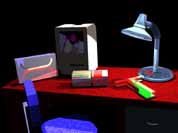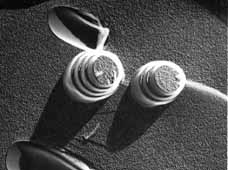
Bioengineering Department, Box 355061, University of Washington, Seattle, WA 98195, USA

 |
Bioengineering Department, Box 355061, University of Washington, Seattle, WA 98195, USA |
 |
Note that the following projects were funded as of the date on which this page
was updated (see last line of page). This does not guarantee that any of them
is funded and active as of the date you read this page, or that if it is still
funded, there are extra funds to support you. If you are interested in working
on one of these projects, please contact PY.
Also, there are projects ongoing at the time that have no external funding,
but are progressing nonetheless....
| Current Project Title | Funding Source |
Dates |
US Army |
9/18-3//20 |
|
| Rapid, Multiplexed Point-of-Care Molecular Detection of Respiratory Pathogens without Sample Prep | NIH SBIR to CrossLife Inc., Cho and Lutz, PIs. |
8/19-7/21 |
UW Center for Dialysis Innovation |
6/19 – 5/20 |
|
NIH NIAID R61/R33 |
7/19 - 6/27 |
|
NIH C-THAN POCTRN |
9/19 – 8/20 |
Return to Yager's Home Page
|
Image of the prototype of the MD NAAT device for ampification and detectiion of Chlamydia from urine samples. Not shown is the urine collection and filtration component |
Chlamydia trachomatis (CT) is a prevalent infection resulting in pelvic inflammatory disease, ectopic pregnancy, infertility and acute and chronic pelvic pain. In the military, CT is a leading cause of reduced readiness among service women, with age- and race-adjusted infection rates nearly six times higher than civilian rates. Current diagnostic tests for CT require up to 48 hours to process, and risk missed treatment due to lack of follow up. Though point of care testing is urgently needed to address this gap, attempts to date have suffered from test inaccuracy. Recently, we developed the Multiplexable Autonomous Disposable Nucleic Acid Amplification Test (MAD NAAT) for the diagnosis of CT and Neisseria gonorrhoeae (NG) with 100% sensitivity and specificity in pre-clinical testing. The aim of the study is to demonstrate the value of the refined (smaller, faster) MD NAAT technology platform for point-of-care clinical testing of urine from collection to detecdtion in less than 1 hour. |
Printed circuit boards developed in the Yager lab for MD NAAT to be the initial basis of the device for the CrossLife Technologies projec |
UW Bioengineering (Lutz and Yager) and Family Medicine in collaboration with CrossLife Technologies and UCSD will develop a rapid test for respiratory infections. The test will be capable of identifying the cause of respiratory infection and be simple enough to be used in non-laboratory settings. The Yager group's component will primarily consist of integration CrossLife's TARA amplification scheme into the MD NAAT platform. The proposal is a fast-track Phase I/II SBIR to NIH.
|
The goal of the project is to create a technology that may delay the need for dialysis, supplement the function of dialysis, or even replace dialysis as a means of treating kidney failure. |
End stage renal disease (ESRD) is a life-threatening condition that affects 650,000 people in the US (>2M worldwide). The mainstay of treatment today is dialysis, which is both extremely expensive ($89,000 annually per patient, >$35 billion total in the US) and only partially compensates for the organ failure; the median survival time on dialysis remains at 3-5 years, with the only exits being death or a kidney transplant. The motivation for this project as supported by the UW's Center for Dialysis Innovation is to reduce the need for dialysis, delay the onset of dialysis, extend the possible time on dialysis, and perhaps eliminate the need for dialysis, through providing a route to removal of key uremic toxins other than classic dialysis. The long-term goal is removal of the principal toxins created by the metabolic processing of foods. |
Atomo Diagnostics' Elion antibody-based immunoassay device, above a recent iteration of the UW MD NAAT device. |
Of the 11 million people currently living with HIV in the United States, a large number do not know their HIV status. As thirty percent of new HIV infections are transmitted by people unaware of their HIV status, early detection of the HIV virus could support public health efforts to stop the spread of the virus. This project, whch is a collaboraton with ELITech Group Molecular System and Atomo Diagnostics, will develop HIVAcute, a NAAT-based fully disposable home test for HIV virus that will allow people to seek treatment for their disease earlier than any home test available today, reduce transmission, and perhaps even help to prevent their becoming HIV positive in the first place.
|
Image of the AudioLyse device as run from a cell phone audio output. From: Electromechanical cell lysis using a portable audio device: enabling challenging sample preparation at the point-of-care, Buser, J.F., Wollen, A., Heiniger, E.K., Byrnes, S., Kauffman, P.C., Ladd, P.D. and Yager, P., Lab on a Chip, 15(9): 1994-1997 (2015) |
Professor Gerard Cangelosi and Yager will collaborate to create a tool to allow oral swabs to be used to diagnose tuberculosis. Specifically to be developed is a small stand-alone device that will permit a swab of the tongue to be processed using heat and a proprietary single-tube bead beater to a sample ready for direct introduction into a nucleic acid amplification system.
|
|
Return to Yager's Home Page Return to Research Page |